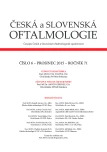-
Medical journals
- Career
First Results and Experience with the iTrace Aberometer
Authors: P. Beneš 1,3; S. Petrová 1,2; P. Veselý 1,2; S. Synek 1,2
Authors‘ workplace: Katedra optometrie a ortoptiky, LF MU, Brno 1; Klinika nemocí očních a optometrie, FN USA, Brno 2; Oční optika RUBÍN, Brno 3
Published in: Čes. a slov. Oftal., 71, 2015, No. 6, p. 312-319
Category: Original Article
Overview
Purpose:
To evaluate obtained data by using a relatively novel devices and their results which are important eg. in refractive and cataract surgery.Material and methods:
The study included 66 eyes (n = 66). Subjects were represented by 32 women and 1 man whose age was 22.5 years ± 1.2 years (min. 21, max. 26 years) without any signs of potential eye disease. Duration of the study was 3 months. Results were compared with the measurements using the auto-refract-keratro-tono-pachymeter (TRK 1P, Topcon, Japan), Keratograph 5M (Oculus, Germany) and aberrometer iTRACE (Hoya, Japan).Results:
After 3 months were statistically compared keratometry values of corneal anterior surface detected by all devices. They provided to be comparable. Furthermore the values of objective refraction and pachymetry were detected.Conclusion:
Results of this study show a statistically significant correlation values of objective refraction using devices TRK and iTRACE (r = 0.66 at p = 0.05) and showed a significant relationship between the keratometric data for all the devices. All used methods and devices are possible to reliably and use for valid evaluation parameters of the eye.Key words:
aberrometry, low and high orders abberations, keratometry, topography, pachymetry
Sources
1. Namba H, Kawasaki R, Narumi M, Sugano A, Homma K, Nishi K, Murakami T, Kato T, Kayama T, Yamashita H.: Ocular higher-order wavefront aberrations in the Japanese adult population: the Yamagata Study (Funagata). Invest Ophthalmol Vis Sci. 2014 Dec 11;56(1):90-7. doi: 10.1167/iovs.14-15261.
2. All About Vision. Higher-Order Aberrations [online]. Citováno 4.3.2015. Dostupné na: http://www.allaboutvision.com/conditions/aberrations.htm.
3. Tracey Technologies. EduTrace_MK0009. Informační příručka. Spirit Medical. 2015.
4. Visionauthorities.com. Night-glare [online]. Citováno 4. 3. 2015. Dostupné na: http://www.visionauthorities.com/blog/2011/03/13/night-vision-and-lasik/night-glare/.
5. Bao J, Rongrong L, Jianqxiu W. et al.: Higher-Order Wavefront Aberration for Populations of Young Emmetropes and Myops. J Optom, 2009; 2 : 51–58.
6. Amano S, Amano Y, Yamagami S et al. Age-related Changes in Corneal and Ocular Higher-order Wavefront Aberrations. Am J Ophthalmol, 2004;137 : 988–992.
7. Alió JL, Shabayek MH.: Corneal Higher Order Aberrations. A method to Grade Keratoconus. J Refract Surg, 2006; 22 : 539–545.
8. Gómez AC, del Rey AV, Bautista CP, Ferrándiz AE, González DC, Burgos SC.: Principles and Clinical Applications of Ray - Tracing aberrometry. J Emmetropia, 2012; 3 : 96-110, ISSN 2171–4703.
9. Molebny VV, Panagopoulou SI, Molebny SV, Wakil YS, Pallikaris IG.: Principles of Ray Tracing Aberrometry. Journal of Refractive Surgery 2000; 16 : 572-575.
10. Beneš, P.: Přístroje pro optometrii a oftalmologii. 1. vyd. Brno: NCONZO, 2015, 250 s., ISBN 978-80-7013-577-8.
Labels
Ophthalmology
Article was published inCzech and Slovak Ophthalmology

2015 Issue 6-
All articles in this issue
- Strabismus Sursoabductorius (put into the Context of eighteen Years of Strabismus Surgery Analysis)
-
About Cryptophthalmos
(2nd Czech Study) - ProVens® in the Therapy of Glaucoma and Ocular Hypertension
- Non-melanotic Tumors of the Eyelids Skin and Inner Corner – Basocellular Carcinoma
- Electronic Device for Retinal and Iris Imaging
- Stereo Vision Deterioration by Artificially Induced Aniseikonia
- First Results and Experience with the iTrace Aberometer
- Czech and Slovak Ophthalmology
- Journal archive
- Current issue
- Online only
- About the journal
Most read in this issue- Electronic Device for Retinal and Iris Imaging
- Strabismus Sursoabductorius (put into the Context of eighteen Years of Strabismus Surgery Analysis)
- Non-melanotic Tumors of the Eyelids Skin and Inner Corner – Basocellular Carcinoma
- ProVens® in the Therapy of Glaucoma and Ocular Hypertension
Login#ADS_BOTTOM_SCRIPTS#Forgotten passwordEnter the email address that you registered with. We will send you instructions on how to set a new password.
- Career

